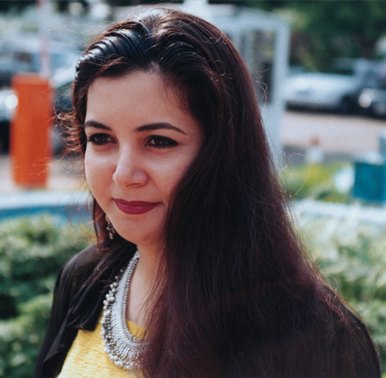Washington Post 17 June 2002
Fiction was the gateway to freedom for Miral al-Tahawy, whose novels describe the clash of her Bedouin traditions with modern life -- and with her own aspirations.
"I wanted to be something other than this daughter or woman who is only allowed to do what others allow you to," al-Tahawy says.
"Life in the world I come from is very special . . . and the world I write about is partially factual and partially what I have picked up myself."
Critics consider al-Tahawy the first novelist to present Egyptian Bedouin life beyond stereotypes and to illustrate the crises of Bedouin women and their urge to break free.
Her first release was a short-story collection in 1995. In 1996 she published her first novel, "The Tent," which was widely acclaimed and translated into six languages. The book's dedication read: "To my body . . . a tent peg crucified in the wilderness."
"The Tent" tells the story of Fatim, a little Bedouin girl who grows up in a world of women all controlled by the patriarchal nature of their society. The novel gives virtually no space to, or description of, male characters.
Al-Tahawy's early years were spent almost exclusively among women. She finds it difficult even to describe a father in a novel, she says.
A writer is the sum "of the experience acquired in life, and had I been exposed to any experience in the male world I would have written about it," the author said.
Yet she credits her father for raising her in a relatively liberal way.
Al-Tahawy was born in 1968, daughter of a tribe known as al-Hanadi that emigrated from the Arab Peninsula in the early 19th century to the Nile Delta province of al-Sharqiya.
As a child, her friends were confined to the world of maids and female relatives. She is the youngest of seven children, five of whom are boys. Her brothers' lives were a total mystery to her.
Despite raising his children in a segregated household -- and ensuring that al-Tahawy's sister accepted a traditional marriage to a cousin -- her father sent all seven of his children to college. Al-Tahawy's sister is a pharmacist.
Her parents, who are first cousins, came from an elite family that had adopted some Western ways. Her father was a surgeon and her mother attended a French boarding school for a short time.
Al-Tahawy received a bachelor's degree from Zagazig University, near her home. But she had to be escorted by a brother to do just about anything, whether it be attending cultural salons or buying books; she could only go out when one of them had time to take her.
She had to fight to pursue the master's in Arabic language and literature she earned in 1995 from Cairo University. Her family thought an undergraduate degree was enough and resisted the idea of her going away to school. She lived in a private home in Cairo while studying for her master's.
Al-Tahawy says she did not lead a "normal life" until after her marriage to renowned Egyptian poet Ahmed al-Shahawy, -- she broke tradition again by marrying outside the tribe. She met her husband after starting her writing career, and says he knows how to cherish her talent.
She believes none of her other relatives cared about her writing, although they were happy to see her picture hitting the front page of newspapers when she was honored at the Cairo Book Fair in 1998.
"Writing gave me self-fulfillment. I never aspired for superficial freedom of going in and out -- freedom to me was to choose my own beliefs and life, and writing gave me all this," al-Tahawy says.
The Bedouin heroine of her second novel, "The Blue Aubergine," makes it to college in Cairo. While "The Tent" depicted the "tragedy" of the sonless mother in a traditional society, Nada's grandmother is ecstatic when Nada's newborn sibling turns out to be a boy.
"A little king came, my honor has been protected from shame," the grandmother chants.
Through Nada, al-Tahawy expresses her own ideological shifts. Both novelist and character were members of fundamentalist Islamic groups in college but ended up rebelling and taking off the veil. Nada curses a society that deforms "the relationship of a woman with her body and humanity."
"I was never part of a feminist group . . . but just like my heroines, I have gone through hard times and this is what I call humanity. You will not find in my writing what is feminist, but what is human," al-Tahawy says.
Al-Tahawy's latest work, "The Gazelles' Taps," tells the story of a woman named Muhra and a family that clings to past traditions amid a changing world.
"Every time I wrote, I created the heroine. It was my creation, but her burden was my burden: Fatim's desire to break free, Nada's self-exploration, Muhra's urge to understand her family," al-Tahawy says.
Interview with Miral Al Tahawy
Unveiling the Lives of Egypt's Bedouin Women
By: Miral Eltahawi - on: Tuesday 12 December 2017 - Genre: Interviews
Upcoming Events

Arabia Felix - Alarabia Alsaida in Bayt Yakan
April 15, 2025
Arabia Felix by Thorkild Hansen, and translated by...

A writer, a vision, a journey: a conversation with Professor Ilan Pappe
March 15, 2025
This event took place on 15 March, 2025 . You may...

مسافر يبحث عن ماء
February 17, 2025
تقيم نقابة اتحاد كتاب مصرشعبة أدب الرحلات تحت رعاي...

Online discussion of The Vegetarian by Han Kang Nobel Prize winner 2024
November 08, 2024
This discussion of Han Kang’s The Vegetarian...
